At Boulders Beach, it’s all about the penguins.
From the moment you pull into the parking area at this reserve just to the south of Cape Town, South Africa, the black-and-white birds are impossible to miss.
You’ll first hear their strange, donkey-like braying echoing from all directions. And then they’ll appear, pretty much where you might expect: swimming in the water, standing on the beach, nesting in bushes.
Then you’ll realize the whole town is a penguin zone. They’re on the sidewalk, in the parking lot and perhaps even in front of your hotel room. Not to mention their likenesses in the form of postcards and paintings and plush toys, available in every shop in town.
Penguins, penguins, everywhere.
The strange thing is, if you had visited Boulders Beach fifty years ago, you would have seen nary a penguin. The beaches would have been quiet, empty.
A stunning conservation success? Well, not quite.
This story is a bit more complicated than that.
Small Penguin, Big City
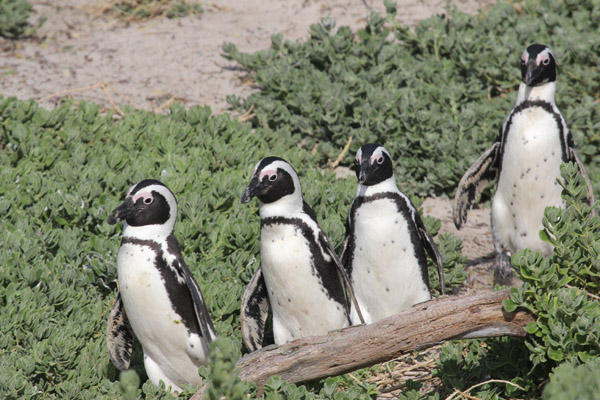
Most people don’t associate penguins with Africa, and in fact the continent has only one species: the African penguin (Spheniscus demersus).
These are not large penguins, standing about two feet tall and weighing from five to seven pounds. Compare that to the emperor penguins – of March of the Penguins fame – that tip the scales at 99 pounds.
Still, the African penguin has all the charismatic features, just in a small package – the tuxedoed appearance, the upright gait. They’re crowd pleasers.
But for most of their existence, they eschewed crowds. African penguins lived and bred on islands off the coasts of Namibia and South Africa. Prior to European colonization of southern Africa, their population was estimated to be in the millions.
They avoided mainland beaches. These areas would have been highly dangerous for small penguins. While their slightly awkward walk makes them so endearing to modern humans, it also makes them an easy catch for terrestrial predators.
A penguin nesting on mainland South Africa would have quickly been gobbled up by a leopard or a caracal or other predator.
As the South African coast was developed with cities, those predators disappeared.
In 1983, a pair was spotted nesting on Boulders Beach, the beach near the community of Simons Town. Unlike earlier penguins that attempted to nest on the mainland, this pair was not promptly devoured. In fact, they had a baby and survived.
More penguins followed, and this year about 2100 pairs nested on Boulders Beach. They became, essentially, urban penguins.
There is another mainland colony in South Africa and one in Namibia.
But that dramatic increase masks a more perilous trend. African penguins are in trouble. Big trouble.
Decline of the Penguins
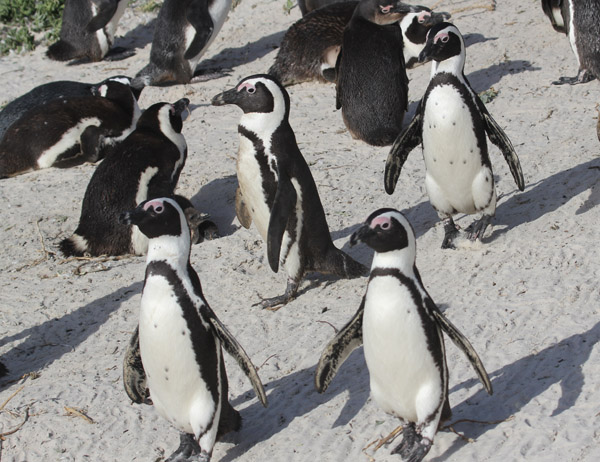
At Boulders Beach, one gets the impression that African penguins are thriving, but it’s not true. Since 1900, the species has been in a precipitous decline.
In the early part of the twentieth century, the penguin’s main threats were egg collecting and guano harvesting (the latter disturbing birds off their nests).
These were relatively simple problems to fix. Lately, the problems have grown more vexing.
There are conflicting accounts of just how much the penguin population has declined, but clearly the declines are severe.
. Most estimate that the overall population was nearly 200,000 pairs in the mid-1990s, and may be as few as 25,000 pairs today.
African penguins feed on sardines and anchovies. These fish are also harvested extensively by the commercial fishing industry.
As these fisheries are exploited near shore, where they are easier to access, the penguins are forced to travel farther – burning calories and leading to reduced survival.
There is also evidence that the sardines and anchovies have shifted their range south, in response to climate change — so even if there was no fishing, the penguins would have increased difficulty accessing plentiful food.
These factors alone would spell trouble for penguins. But an oil spill in 2000 near Robben Island, infamous as the prison that held Nelson Mandela and other anti-apartheid leaders, affected nearly 40 percent of the South African population. While many birds were rescued, the oil spill took a tremendous toll on the birds.
If the population continues to decline at the current rate, African penguins could be extinct within decades.
Urban Penguin Ambassadors?
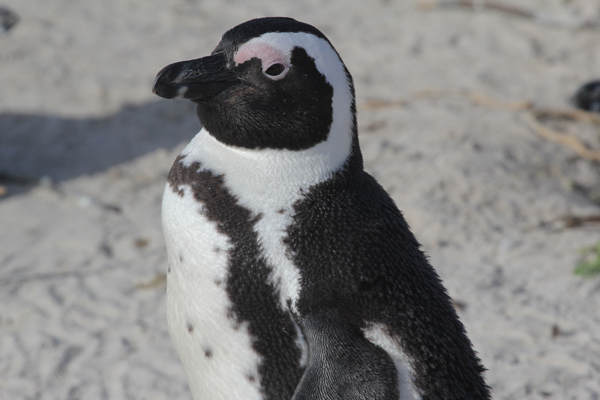
Early naturalists reported that African penguins were skittish around humans. They didn’t fare well with human disturbance.
At Boulders Beach, they’ve adapted quite well to camera-wielding humans. They walk and nest undisturbed just a few feet from visitors.
In fact, during my visit last month, we had a pair with with two young ones that had taken residence two doors down from our hotel room.
Boulders Beach is now a reserve, part of Table Mountain National Park. There are rules in place to protect the birds from human disturbance, with a nice boardwalk to bring you up close without impacting penguin behavior.
They still face threats here – vehicles, nearby beachfront development and feral pets all take their toll.
But Boulders Beach may still be the best opportunity these penguins have – not just for the nesting beach, but to help get the word out.
Some 60,000 visitors come to see the penguins each year. The South African Cape has the well-deserved reputation as one of the best places on earth to see coastal wildlife, and it draws a lot of traveling naturalists to see the great white sharks, southern right whales and penguins. It’s one of the main reasons I traveled there in September.
Could the tourism industry become a force for penguin conservation? Right now, the penguin decline seems glossed over at Boulders Beach, even though the birds are the main driver for tourists to visit.
The penguins have proven adept at urban living. Maybe these city beach penguins could also become wildlife celebrities — alerting others to the problems facing coastal creatures around the world.
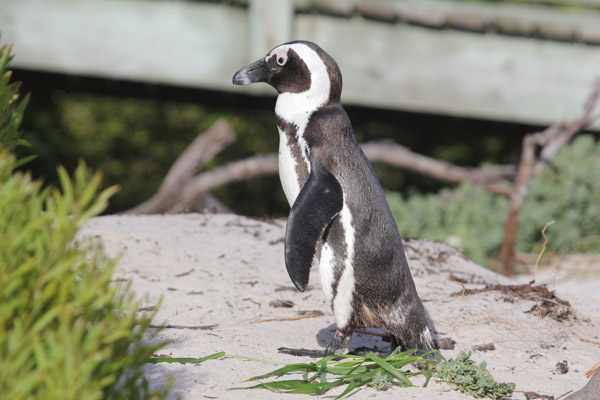
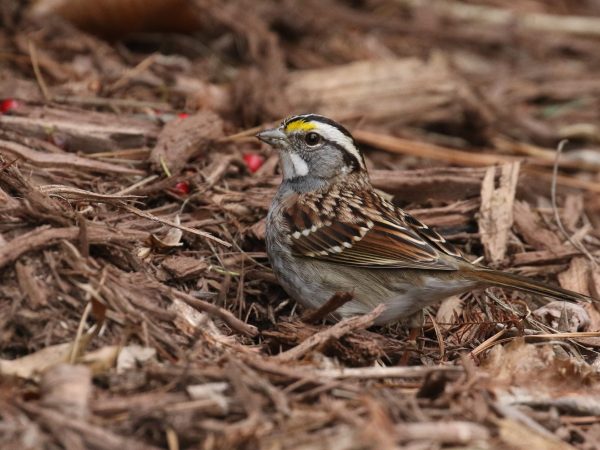
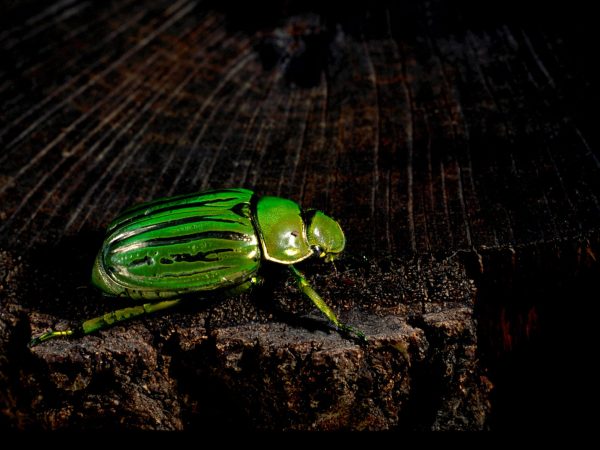
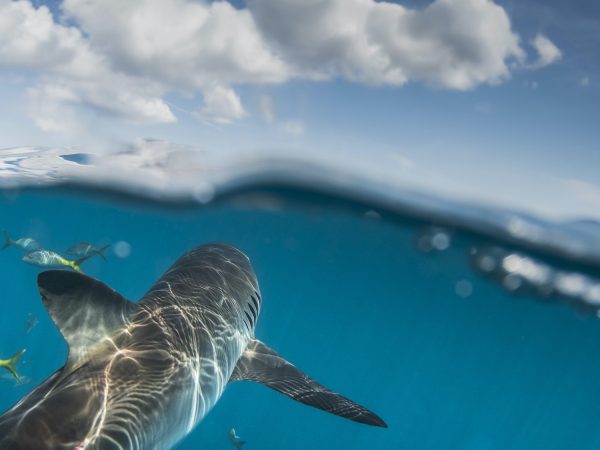
Join the Discussion
2 comments